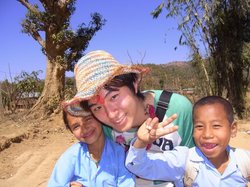「学生団体KIVOの出発点はネパール人の優しさに触れたこと」
※Japanese followed by English Translation
国際協力学生団体KIVO第3期代表
(国際基督教大学2年)
山田 哲也
ネパール人の優しさに触れ、何かしたくなったからが原点
現在私は学生団体KIVOの代表として、「ネパールの子どもに本を届ける」という活動をおこなっています。なぜ私たちがネパールで活動を行なうようになったのでしょうか。 私たちの団体は、3年前に竹内、池田という二人の先輩が立ち上げたものです。二人はネパールに入る前にインドを旅行していましたが、そこで散々な目に会い、意気消沈していました。ところが、ネパールに着いてから、とても幸せな気持ちになったと言います。人が本当に優しく接してくれ、そして純粋に日本人を歓迎してくれました。そこで彼らはすっかりネパールの虜(とりこ)なってしまいました。その大好きという気持ちがKIVOの活動のきっかけかもしれません。しかし、そこで問題点も発見しました。
ネパールでは、本を読みたくても自由に本を読むことができないという事実
訪れた学校では、図書室の鍵がかけられたままで、子供たちが自由に本を読める環境にありませんでした。そういった環境を打開したい、と思いKIVOの活動がスタートしました。
学生ができることを通じてネパールに影響を与える
私たちの団体は学生だけで構成されています。国際機関やJICA、力のあるNGOに比べて、まとまった予算があるわけでもなく、技術が特別あるわけでもなく、現地に一年間滞在する時間もありません。実際学生にできることは本当に限られています。
しかし、私たちにもできることはあります。「本をできるだけ直接届けること」そして「実際に現地に行って現地の人と一緒に活動する」ことを大事にしています。
本は一時的支援でなく、受け継がれ"知的資本"になる
私たちがなぜ本を届けているかというと、簡単にいうと、三点あります。学生にできること、子供たちの将来の可能性を広げるもの、そして長期的に残るもの、だからです。本は食料支援のように一時的な支援ではなく、受け継がれ、"知的資本"として残るものです。そして本の中には子供たちがまだ見ぬ世界が詰まっています。私たちだけでは、ネパールの未来は変えられないかもしれませんが、その本を読んだ子供たちが10年後、20年後に本で得た知識を使ってネパールを良くしていってほしい、そういった思いを持って活動しています。
現地の人と活動することが基本
また、私たちは現地の人と一緒に活動することを大切にしています。過去には、本棚や遊具(サッカーゴールなど)を作りましたが、これらは現地の人たちと一緒に、共同で作り上げたものです。上からの一方的な支援ではなく、常にパートナーとして、そしてお互いがお互いを助け合う関係を目指しています。村で木を切っていたときには、村の人たちが自然と手を貸してくれました。そういった中で会話が生まれ、お互いのことを知り、理解し合うことでお互いを好きになる。そんな関係を保てればいいなと常に思っています。その関係のなかで、私たち学生ができる最大限のことを現地の人と一緒に作り上げていこうと考えています。
最後に
自戒の念も含め、「ボランティアをしに行っているのではなく、させてもらっているのだ」という意識を忘れないでおきたいと思います。これは、これからボランティアに従事する方々に贈る言葉でもあります。「常に感謝の気持ちを忘れずに活動を」―――母の言葉ですが、私はいつも大切にしたいと思っています。
【参考】国際協力学生団体KIVO
http://kivo-col.com/
Twitter: @KIVO2010
山田 哲也(現代表)
Twitter: @tecchan3434
Kindness from Nepalese was "KIVO"'s Starting Point
Tetsuya YAMADA
Nepalese Kindness made us take actions
I am the delegate of the student organization "KIVO". KIVO stands for Keio
International Volunteer Organization. Keio is one of the name of university
in Japan. Fist, we all were from Keio University, but now we are from
various universities in Japan. So, today we use KIVO as "Hope" which is
the meaning of KIVO in Japanese. We deliver books to Nepalese children.
I'd like to write about the process of why we started this project.
Two senior university students established this organization four years ago.
They became overjoyed when they arrived in Nepal. The Nepalese showed
tremendous hospitality to their guests and welcomed Japanese with openarms.
With these experiences they were totally captivated by this country.
Their feelings might have been why KIVO was started. However, they also
found some problems in Nepal.
They Cannot Read Books Even If They Want To
They saw that the library room was locked. Children couldn't read books
as freely as they liked. In order to change this detrimental situation, KIVO's
activity would be launched.
Making an Impact Through What Students Can Do
Our organization is composed of only university students. Compared
with International organizations, JICA (Japan International Cooperation
Agency), or powerful NGO, we don't have a sufficient budget or specialized
skills. We don't have time to stay one year in Nepal, either. What we can do
is limited.
However, we are not hopeless. We make it a priority to "directly deliver
books as much as possible", and "create activities with the local people
together". For example, we built a library last year (2012). Local villagers
carried bricks and woods which we Japanese even cannot have. On the
other hand, we designed a classroom and decorated the wall according to
their needs.
Books as Intellectual Capital
There are three main reasons why we deliver books. The first one is
that even university students can do it. The second one is that it widens
the future possibilities for children. The third one is that books are
indispensable and reusable. Books, unlike food aid, are not temporary.
They are passed on from generation to generation and reserved as
"intellectual capital".
Moreover, by reading books, children can obtain a
broad perspective for world. Our actions alone won't make an expedite and
direct Nepalese future, but those children who read books will have a better
chance of education and utilize it to improve their own country in 10 to 20
years. We have such activity in mind.
"Activity with Local People" is Our Basis
We also make it important to interact with people who live there. We
made bookshelves and constructed playground equipment like soccer
goals posts with the help of villagers. We hope not to just be a hierarchical
support but permanent partners, we aim to establish lasting relationships.
When we cut wood in one particular village, they naturally helped us. We
made conversation, got to know, understand, and finally accept each other.
I hope to create more relationships like this.
In the end
We don't go "help" just to volunteer. It's also about self-discipline. This
mindset is important to adopt for anyone thinking of volunteering. My
mother always tells me, "Never forget to be humble and always appreciate
the relationship you're made." This advise keeps me motivated, to keep
fighting for the KIVO cause.
(Translated by Tatsuya YABUUCHI, A Visiting Fellow at the Gap Year Institute of JGAP,and revied by Tetsuya YAMADA)

